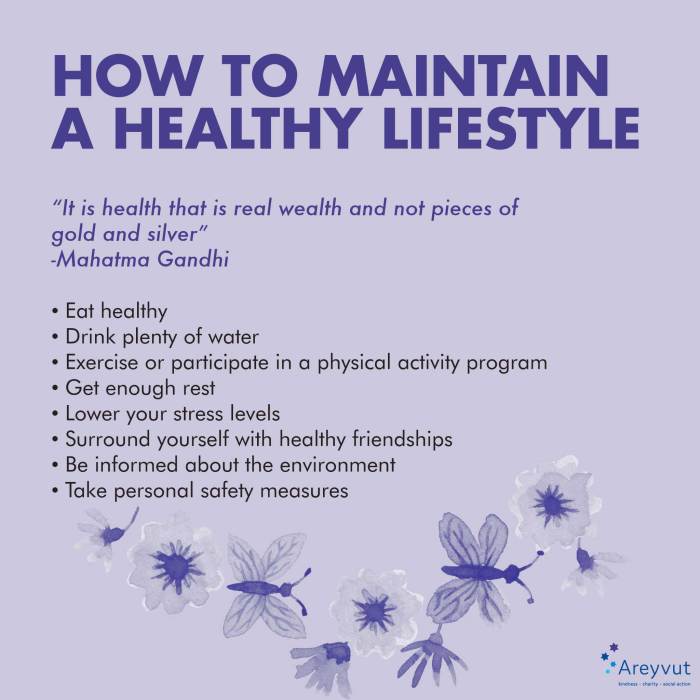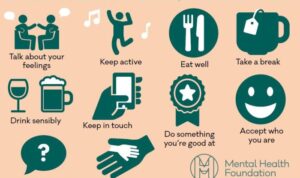Healthy Lifestyle Tips sets the stage for this enthralling narrative, offering readers a glimpse into a story that is rich in detail with american high school hip style and brimming with originality from the outset.
Embark on a journey to discover the key components of a healthy lifestyle, from nutrition and exercise to mental well-being and sleep hygiene. Get ready to revolutionize your daily routine with these transformative tips!
Importance of Healthy Lifestyle: Healthy Lifestyle Tips
Maintaining a healthy lifestyle is crucial for overall well-being and quality of life. By adopting healthy habits, individuals can experience a wide range of benefits that positively impact their physical, mental, and emotional health.
Benefits of Adopting a Healthy Lifestyle
- Improved physical health: Regular exercise and a balanced diet can help prevent chronic diseases such as heart disease, diabetes, and obesity.
- Enhanced mental well-being: Healthy lifestyle choices, such as getting enough sleep and managing stress, can improve cognitive function and reduce the risk of mental health disorders.
- Increased energy levels: Eating nutritious foods and staying active can boost energy levels, making it easier to tackle daily tasks and stay focused.
How a Healthy Lifestyle Can Improve Overall Well-being
- Reduced risk of illness: By prioritizing health, individuals can strengthen their immune system and decrease the likelihood of getting sick.
- Enhanced longevity: Healthy habits can increase life expectancy and improve quality of life as individuals age.
- Better mood and emotional stability: Exercise releases endorphins, which can help alleviate stress and improve mood, leading to a more positive outlook on life.
Examples of How Healthy Habits Can Positively Impact Daily Life
- Starting the day with a nutritious breakfast can provide sustained energy and improve focus throughout the morning.
- Taking breaks to stretch and move during the workday can reduce stiffness and improve productivity.
- Practicing mindfulness or meditation can help reduce stress and promote relaxation, leading to better sleep and overall well-being.
Nutrition and Balanced Diet

Eating a balanced diet is essential for maintaining good health and overall well-being. A balanced diet consists of a variety of nutrients that provide the necessary energy and support for bodily functions.
Components of a Balanced Diet
A balanced diet typically includes:
- Proteins: Found in meat, fish, eggs, dairy products, nuts, and seeds.
- Carbohydrates: Found in whole grains, fruits, vegetables, and legumes.
- Fats: Healthy fats are found in avocados, olive oil, nuts, and seeds.
- Vitamins and minerals: Found in fruits, vegetables, whole grains, and dairy products.
- Water: Essential for hydration and overall body function.
Examples of Nutritious Foods
Incorporating the following foods into your daily diet can help you maintain a balanced and nutritious intake:
- Leafy green vegetables like spinach and kale
- Lean proteins such as chicken, turkey, and tofu
- Whole grains like quinoa, brown rice, and oats
- Fruits like berries, apples, and oranges
- Dairy or dairy alternatives for calcium and vitamin D
Importance of Hydration
Hydration plays a crucial role in maintaining a healthy lifestyle as water is essential for various bodily functions, including digestion, nutrient absorption, temperature regulation, and waste removal. Staying hydrated helps prevent dehydration, supports skin health, and aids in overall physical performance and cognitive function.
Physical Activity and Exercise
Regular physical activity plays a crucial role in promoting a healthy lifestyle by improving overall health and well-being. Incorporating exercise into your daily routine can have numerous benefits, including boosting mood, increasing energy levels, and reducing the risk of chronic diseases.
Types of Exercises
- Cardiovascular exercises: Activities like running, cycling, or swimming that elevate your heart rate and improve cardiovascular health.
- Strength training: Using weights or resistance bands to build muscle strength and increase metabolism.
- Flexibility exercises: Stretching routines to improve flexibility, prevent injuries, and enhance mobility.
- Balance exercises: Activities like yoga or tai chi that improve balance and stability, reducing the risk of falls.
Benefits of Regular Exercise
Regular exercise contributes to overall health by:
- Improving cardiovascular health and reducing the risk of heart disease.
- Boosting mood and reducing symptoms of anxiety and depression.
- Enhancing muscle strength, bone density, and joint flexibility.
- Managing weight and preventing obesity.
- Increasing energy levels and promoting better sleep quality.
Mental Health and Stress Management
Maintaining good mental health is essential for overall well-being. It is closely connected to living a healthy lifestyle and can impact all aspects of our lives, including our physical health.
Tips for Managing Stress Effectively
- Acknowledge your stress triggers and work on ways to avoid or minimize them.
- Practice relaxation techniques such as deep breathing, meditation, or yoga to calm your mind.
- Stay organized and prioritize tasks to prevent feeling overwhelmed.
- Exercise regularly as it helps reduce stress hormones and boost endorphins.
- Connect with friends and family for emotional support and to share your feelings.
Importance of Self-Care Practices for Mental Well-being
- Self-care activities like getting enough sleep, eating nutritious foods, and engaging in hobbies can improve mental health.
- Setting boundaries and learning to say no when needed can prevent burnout and reduce stress.
- Practicing mindfulness and being present in the moment can help alleviate anxiety and improve mental clarity.
- Seeking professional help through therapy or counseling is important for managing mental health conditions and stress.
Sleep Hygiene and Rest

Quality sleep is essential for maintaining a healthy lifestyle as it allows the body to rest, recover, and recharge. Adequate rest is crucial for overall health, including physical, mental, and emotional well-being. Poor sleep habits can lead to a variety of health issues, including weakened immune system, weight gain, mood swings, and decreased cognitive function.
Improving Sleep Hygiene
- Avoid caffeine, nicotine, and heavy meals close to bedtime.
- Create a relaxing bedtime routine to signal your body that it’s time to sleep.
- Keep your bedroom dark, quiet, and at a comfortable temperature.
- Avoid screens (phones, computers, TVs) at least an hour before bed.
- Establish a consistent sleep schedule, going to bed and waking up at the same time every day.
Impact of Adequate Rest
- Improved concentration and productivity.
- Enhanced mood and emotional well-being.
- Stronger immune system and better overall health.
- Reduced risk of chronic conditions like heart disease and diabetes.
- Enhanced athletic performance and faster muscle recovery.
Healthy Habits for Daily Routine
Incorporating healthy habits into your daily routine can have a significant impact on your overall well-being. Small changes can lead to a healthier lifestyle, and consistency is key to reaping long-term benefits.
Start Your Day with Hydration
- Drink a glass of water first thing in the morning to kickstart your metabolism.
- Carry a reusable water bottle with you throughout the day to stay hydrated.
- Replace sugary drinks with water or herbal teas to reduce empty calorie consumption.
Get Moving Regularly
- Take short walks during breaks or after meals to stay active throughout the day.
- Incorporate stretching exercises into your morning routine to improve flexibility.
- Schedule regular workout sessions to strengthen your body and boost your mood.
Prioritize Nutrient-Dense Foods, Healthy Lifestyle Tips
- Include a variety of fruits and vegetables in your meals for essential vitamins and minerals.
- Opt for whole grains and lean proteins to fuel your body with sustained energy.
- Avoid processed foods and opt for homemade meals to control your nutrient intake.
Practice Mindfulness and Stress Management
- Set aside time for meditation or deep breathing exercises to reduce stress levels.
- Engage in activities you enjoy to unwind and relax after a long day.
- Establish a bedtime routine to promote restful sleep and mental clarity.

